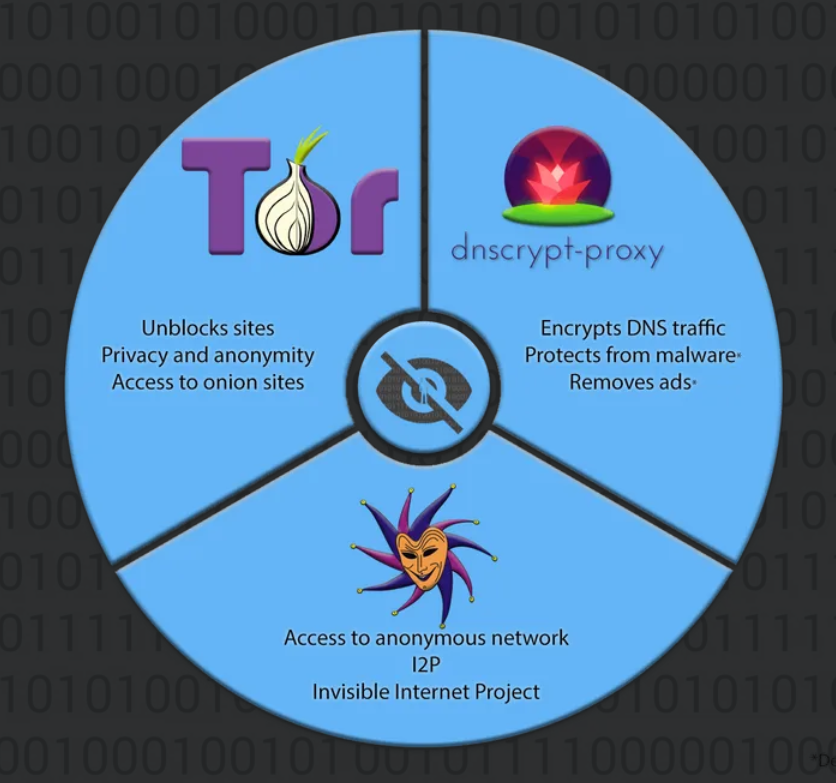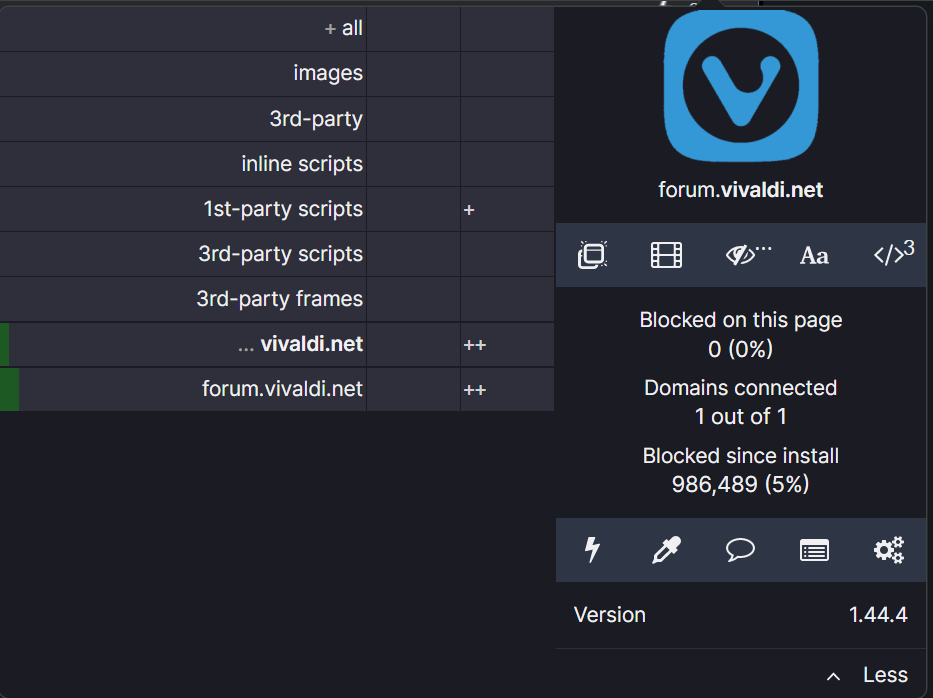Manifest V3, webRequest, and ad blockers
-
-
@barbudo2005 , yes, way better with more features.

-
@Jknapp1208 said in Manifest V3, webRequest, and ad blockers:
You should switch to rust adblock by Brave to conserve memory. It is closely based on Ublock and integrates directly into the browser engine itself.
"closely based?" not even close I'd say, uBlock Origin is way more than an ad-blocker but not many people seem to know it
-
@julien_picalausa: Thanks !
From my POV, keeping as much of the API as easily possible would be a very good plus for V : beyond just the few advertised extensions needing webRequest, you will also have a lot of the backlog of abandoned but still working extensions that will not be updated to Mv3 available for V.
That's a huge ecosystem already there.
(but of course, I'm aware of the problematics of doing it, UI/UX wise, and store wise, beyond just the implementation) -
This post is deleted! -
@TalGarik said in Manifest V3, webRequest, and ad blockers:
it seems quite obvious that the users who will notice how crippled will be their privacy extensions once V3 will kill V2 are users of uBlock Origin and other similar extensions, people liking a granular control of what is going on.
If we look at the download numbers of these extensions - in Chrome, Firefox and Opera's extensions stores - we can notice that these users represent a very small niche, so IMHO the damage to the performance of the extensions brought by V3 is a side effect, it would be ridiculous to think that Google created a complex novelty like V3 to bother 20 millions users (at best)
At the same time that same niche of users - which for Chrome is a drop of water in an ocean - is vital for small companies like Vivaldi.
I guess Vivaldi needs to elevate the level of its internal ad-blocker to uBO levels, this is the only way not to lose users to Firefox.
Frankly I do not know what I will do myself, there are two browsers having features that I consider essential and both of them are chromium based browsers and Firefox cannot match those features.
Alas all of this was sadly predictable: who owns the engine owns the browser.This is spot on. I know for a fact one way or another I will not be having my privacy infringed on. I can pretty much guarantee that if Vivaldi doesn't step up someone else will.
-
In Reddit of uBO:
"June 2023 is the deadline for manifest v2 (for stable chromium version) according to this article"
https://www.reddit.com/r/uBlockOrigin/comments/xrvw9q/june_2023_is_the_deadline_for_manifest_v2_for/
https://developer.chrome.com/docs/extensions/mv3/mv2-sunset/
-
@barbudo2005 . I don't know, but I don't get rid of the suspicion that with Mv3 Google is going to shoot itself in the knee.
-
@Catweazle said in Manifest V3, webRequest, and ad blockers:
@barbudo2005 . I don't know, but I don't get rid of the suspicion that with Mv3 Google is going to shoot itself in the knee.
while these days we are seeing a sort of psychodrama on various social platforms, most of it is due to the misunderstanding that with Manifest V3 Google will ban/eliminate ad-blocking extensions. IMHO the number of users who will see a dramatic change in their desktop internet experience is very limited: people who simply install uBO and don't use its advanced features will not notice much of a difference with uBlock Lite.
If ad-blockers - and particularly uBlock Origin - were a factor capable of moving people to another browser then Firefox' android market share should not be around 0%
-
The pertinent question based on this information (https://developer.chrome.com) is, will we be able to continue using uBO until June 2023?
-
@barbudo2005 , yes but

-
The Brave content blocker (Brave Shields) is also open-source and freely-licenced (see below).
https://www.youtube.com/watch?v=mbko-tcviFc&t=963s
It would make more sense for Chromium-based browsers to adopt and work with that, rather than starting again. The uBlock Origin developer has shown disdain towards Chromium-based browsers in the past; it wouldn't surprise me if he ditched Chromium support at some point and just concentrated on Firefox (which is the browser he's really interested in). Brave would have more accountability than relying on a single anonymous extension developer.
-
I know, but 9 months are better than 3.
-
@Catweazle said in Manifest V3, webRequest, and ad blockers:
@barbudo2005 . I don't know, but I don't get rid of the suspicion that with Mv3 Google is going to shoot itself in the knee.
More like in the head.
-
I agree. The Brave Rust-based content blocker is open-source and freely-licenced (see below).
https://www.youtube.com/watch?v=mbko-tcviFc&t=963s
It would make sense for Chromium-based browsers to adopt and work with that, rather than trying to keep webRequest functioning to allow uBlock Origin to continue working. The uBlock Origin developer has shown disdain towards Chromium-based browsers in the past; it wouldn't surprise me if he ditched Chromium support at some point and just concentrated on Firefox (which is the browser he's really interested in). Brave would have more accountability than relying on a single anonymous extension developer.
-
"For users, it means that they do not have to worry about extensions running out of support until January 2024, provided that they either apply the Enterprise policy to extend the deadline, or have it applied by the maker of a Chromium-based browser."
https://www.ghacks.net/2022/09/29/google-delays-the-death-of-manifest-v2-extensions-to-2024/
-
With a year, this (In Vivaldi we trust):

-
@barbudo2005 Updates will be disabled sooner. But yes, Vivaldi potentially has a full year to create the best internal adblocker there is.
-
Update on what?
-
@barbudo2005 Manifest v2 extensions. That they will continue to run doesn’t mean Google will allow updates. Updates were supposed to end in January 2023, I’d expect them to stop in the following summer with the new plan, well ahead of the complete phase out. It should also be noted new v2 extensions can no longer be uploaded to the webstore, this stopped working at the start of this year.
